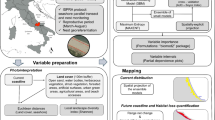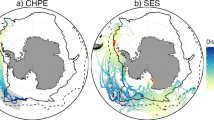Abstract
In this paper the realized niche of the Snowy Plover (Charadrius alexandrinus), a primarily resident Florida shorebird, is described as a function of the scenopoetic and bionomic variables at the nest-, landscape-, and regional-scale. We identified some possible geomorphological controls that influence nest-site selection and survival using data collected along the Florida Gulf coast. In particular we focused on the effects of beach replenishment interventions on the Snowy Plover (SP), and on the migratory Piping Plover (PP) (Charadrius melodus ) and Red Knot (RK) (Calidris canutus ). Additionally, we investigated the potential differences between the SP breeding and wintering distributions using only regional-scale physiognomic variables and the recorded occur- rences. To quantify the relationship between past renourishment projects and shorebird species we used a Monte Carlo procedure to sample from the posterior distribution of the binomial probabilities that a region is not a nesting or a wintering ground conditional on the occurrence of a beach replenishment intervention in the same and the previous year. The results indicate that it was 2.3, 3.1, and 0.8 times more likely that a region was not a wintering ground following a year with a renourishment intervention for the SP, PP and RK respectively. For the SP it was 2.5. times more likely that a region was not a breeding ground after a renourishment event. Through a maximum entropy principle model we observed small differences in the habitat use of the SP during the breeding and the wintering season. However the habitats where RK was observed appeared quite different. While ecological niche models at the macro-scale are useful for determining habitat suitability ranges, the characterization of the species’ local niche is fundamentally important for adopting concrete multi-species management scenarios. Maintaining and creating optimal suitable habitats for SP characterized by sparse low vegetation in the foredunes areas, and uneven/low-slope beach surfaces, is the proposed conservation scenario to convert anthropic beach restorations and SP populations into a positive feedback without impacting other threatened shorebird species.
Similar content being viewed by others
Article PDF
Author information
Authors and Affiliations
Corresponding author
Rights and permissions
About this article
Cite this article
Convertino, M., Donoghue, J., Chu-Agor, M. et al. Anthropogenic Renourishment Feedback on Shorebirds: a Multispecies Bayesian Perspective. Nat Prec (2011). https://doi.org/10.1038/npre.2011.5872.1
Received:
Accepted:
Published:
DOI: https://doi.org/10.1038/npre.2011.5872.1



